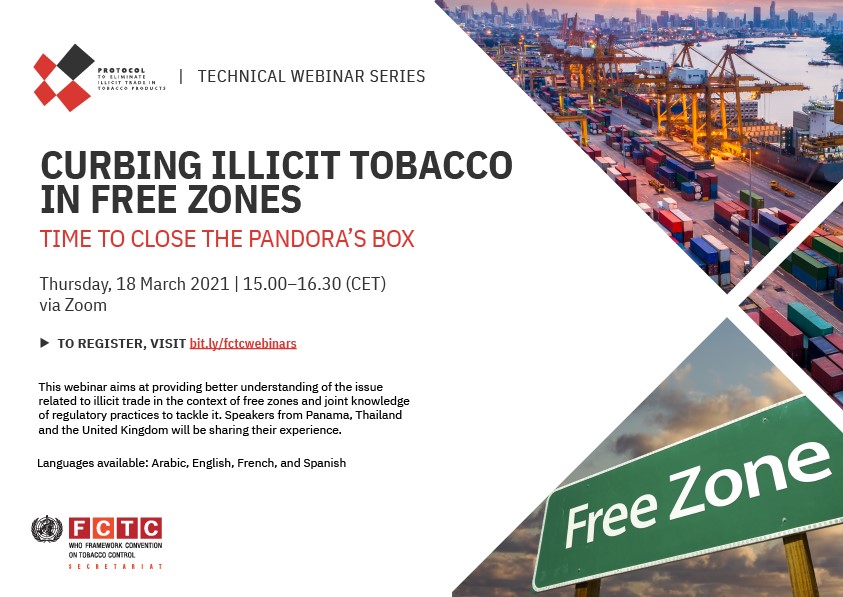With only a limited number of product inspections carried out inside free zones, many customs administrations now require that tobacco products carry a special declaration with detailed information that would enable joint investigations, effective risk management and electronic recordkeeping, as highlighted in a report published by the Secretariat of the WHO Framework Convention on Tobacco Control (WHO FCTC).
The report, Examples of current practices on the implementation of Article 12 (Free zones and international transit) of the Protocol to Eliminate Illicit Trade in Tobacco Products, will be launched on 18 March 2021 during a technical webinar sponsored by the Secretariat of the WHO FCTC.
The report focuses on implementation of Article 12 of the Protocol to Eliminate Illicit Trade in Tobacco Products, with a view to showcasing international good practices in the operation and control of free zones.
What are free zones?

Free zones – also referred to as special economic zones, export processing zones or free ports – can be broadly defined as special economic areas that benefit from tax and duty exemptions. Governments across the world increasingly are turning to free zones as a means of promoting economic growth and investment. While geographically located within a country, free zones essentially exist outside its borders for tax purposes, and as a result can offer a variety of financial and administrative incentives to attract export businesses, foreign investment and employment.
It has been reported that free zones in many countries are often used to manufacture and transport illicit goods, including tobacco products, as controls and inspections by enforcement agencies are often irregular and less frequent.
Article 12 of the Protocol focuses specifically on the issues related to free zones and international transit. It requires Parties to the Protocol to implement effective controls on manufacturing and transactions, and it also prohibits intermingling of tobacco and non-tobacco products in a single container. It also calls on Parties to adopt and apply control and verification measures to the international transit or trans-shipment of tobacco products.
The report further found that many countries are prohibiting the intermingling of tobacco products by adopting a policy that prohibits cigarettes from being shipped in a container that also contains other commodities and requires that containers be weighed to ensure that the goods declaration is compatible with the reported contents. Greater transparency in the movement of goods and harmonization of data for better recordkeeping were some other good practices presented in the report.
“Free zones are created to generate employment and encourage investment; however, they should not be used as hunting grounds for smuggling tobacco products or facilitating their illicit warehousing and movement,” said Dr Adriana Blanco Marquizo, Head of the Secretariat of the WHO FCTC, which also serves as the Secretariat for the Protocol. Dr Blanco Marquizo believes that Parties would benefit from the examples highlighted in the report and counts on Parties to continue sharing experiences so that concerted and cooperative efforts against illicit trade of tobacco bring positive results in the strengthening of tobacco control policies at national and international levels.
The Protocol, which includes 62 Parties and entered into force on 25 September 2018, was developed in response to growing concerns regarding illicit trade in tobacco products and its role in fuelling the tobacco epidemic, often across borders.
The webinar on 18 March 2021 will be the first in a series of seven webinars focusing on various aspects of implementation of the Protocol. The Convention Secretariat expects that policy-makers from the customs, trade and health sectors, along with experts and representatives of intergovernmental and nongovernmental organizations, will take part in the webinar, during which Parties will share their experiences in implementing Article 12 of the Protocol.
